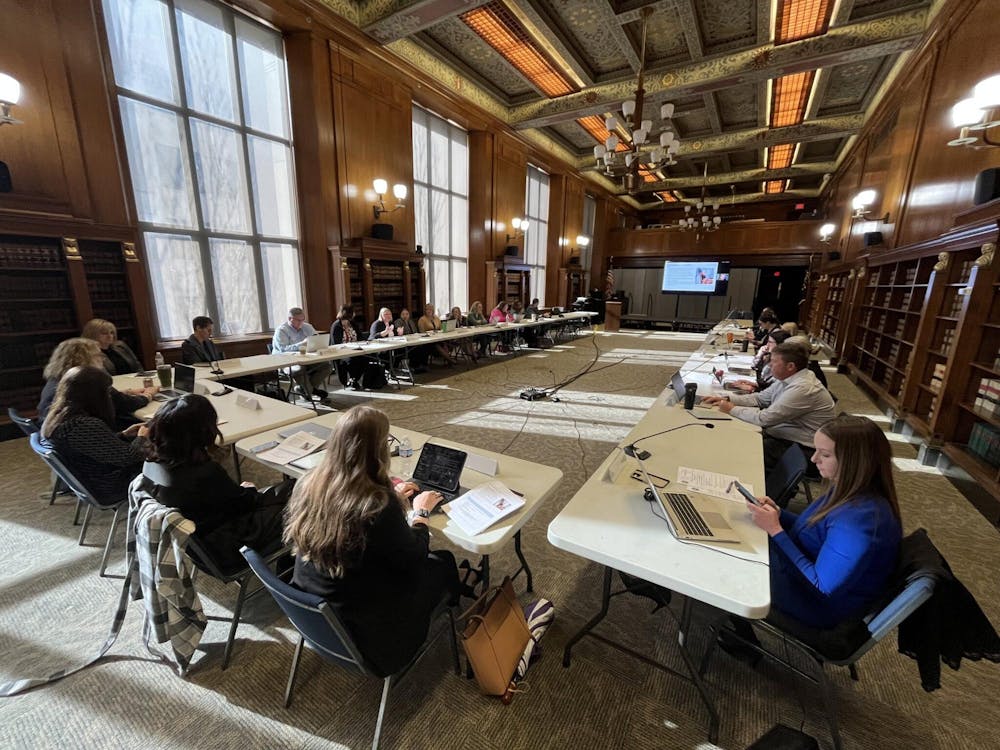This story was written by Whitney Downard. It was originally published by the Indiana Capital Chronicle here: https://indianacapitalchronicl...
The providers and seniors interacting with the PathWays Medicaid program continue to encounter hurdles related to their health care, as documented in a two-hour Wednesday meeting of the Medicaid Advisory Committee.
PathWays to Aging launched in July, introducing managed care entities into the health care services of Hoosiers ages 60 and older who are enrolled in Medicaid. One of the touted benefits of managed care was supposed to be its reliance on service and care coordinators to navigate obstacles to care for beneficiaries — but not everyone knows who is supposed to help them, according to some.
Indianapolis Rep. Robin Shackleford, a Democrat, shared the issues and confusion she heard from both constituents and clients. In her professional life, Shackleford works as an insurance broker.
“When (seniors) call into the PathWays number, they’re not getting the information that they need. They’re being sent or redirected or the agent just doesn’t know who their (managed care entity) is,” Shackleford said. “It’s very frustrating.”
Representatives from each MCE — Anthem Blue Cross and Blue Shield, Humana Healthy Horizons in Indiana and United Healthcare Community Plan — each assured Shackleford that members had been assigned to coordinators, but she had concerns about whether enrollees knew who to contact.
“Being assigned is one thing, but then it being communicated to the actual senior so they know who their person is? That’s a different story,” Shackleford said. “… They’re asking me coordinator questions; they don’t understand their benefits.”
For example, 80% of those enrolled in PathWays under Medicaid also qualify for Medicare, a separate program overseen by the federal government with a different set of benefits. Beneficiaries may accidentally use Medicare benefits for transportation when their Medicaid benefits have more options and greater flexibility. MCE coordinators are supposed to help users navigate these two systems.
The state hired Maximus, a familiar contractor for the Family and Social Services Administration, for ombudsman and member support services. That call center reported that questions related to an enrollee’s care or service coordination were one of the top reasons why seniors called.
Members also called for more basic information, such as asking which insurer oversaw their coverage.
[subsets]Delays in payments to providers[/subhed]
Providers, such as nursing home operators or adult day centers, have repeatedly shared problems getting reimbursed for the care they provide to PathWays members.
Holly Cunningham Piggot, the director of care programs overseeing the managed care transition, detailed various ways FSSA monitored provider claims submitted to MCEs. The insurers are required to submit reports on a weekly basis including timeliness, payment and denial rates and reasons for denials.
Additionally, a workgroup and advisory committee staffed by members from both MCEs and provider associations meet regularly to discuss ongoing issues.
“They’re able to hear real time, real life issues that the providers are experiencing — because we know providers are experiencing it — and probably the provider world as a whole is experiencing it,” Cunningham Piggot said. “So they’re able to take that feedback back to their team and work on correcting those issues.”
Still, MCEs have been sluggish to adjudicate, or process, claims.
“We definitely aren’t where we need to be and we know this,” Cunningham Piggot said. “We’re really working tirelessly to get these things corrected.”
In an example shared with the group, Anthem had missed the mark for paying claims in a timely manner between Aug. 19 and Nov. 1. — specifically to facility providers, of which just 78% were paid within three weeks. Because of those delays, Anthem had paid nearly $11,000 in interest on top of base payments.
Cunningham Piggot also noted that the Temporary Emergency Financial Assistance Program for providers would close on Jan. 31 but had received at least 275 applications so far. She added that not every applicant qualified for relief — though she didn’t specify the number — and may have received assistance directly from an MCE.
Update to Medicaid Waiver Waitlists
In April, FSSA announced that it would implement a waitlist for waiver services related to PathWays as well as the Health and Wellness waiver — the latter of which would include Hoosiers with disabilities.
Initially, the state committed to inviting 925 Hoosiers off of the waitlist each month, 800 from PathWays and 125 from Health and Wellness. In October and November, the state more than doubled the number of applicants invited off of the waitlist for both waivers.
As of November 18, 8,923 seniors were waiting for additional PathWays services while, as of Nov. 13, 4,709 individuals were waiting for waiver services under Health and Wellness.
To give applicants a rough estimated waiting time, the state started reporting the “Original Level of Care date,” essentially an application date, this month. For Hoosiers accessing the Health and Wellness waiver, they’re working on applications submitted in mid-February. For PathWays applicants, processing is up to April 1.
However, the agency may face legal repercussions due to the length of the waitlist, which is still months long. Five seniors filed a class action lawsuit against FSSA in October, arguing that the state’s actions violated federal law, as reported by the IndyStar.






